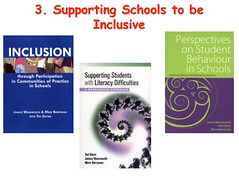 I have just been participating in a thought provoking webinar entitled Te Kotahitanga PD including Culturally Responsive Pedagogy of Relations, and facilitated by Mere Berryman. It was Mere's first time facilitating in a Webinar environment, and she faced all the technical hiccups with aplomb...and gave the participants a lot to think about.
I have just been participating in a thought provoking webinar entitled Te Kotahitanga PD including Culturally Responsive Pedagogy of Relations, and facilitated by Mere Berryman. It was Mere's first time facilitating in a Webinar environment, and she faced all the technical hiccups with aplomb...and gave the participants a lot to think about.- Providing interesting materials that promote engagement by the learner
- Delaying and reducing direct teacher instructions and direction so as to allow opportunities for learners to initiate
- Maximising opportunities for shares activities between less-skilled and more-skilled learners so there can be reciprocal learning
Mere described the Te Kotahitanga Effective teaching profile where teachers are culturally appropriate and responsive, and possess a number of understandings, especially the rejection of deficit theorising, where the focus is rather on what learners can do. Teachers demonstrate these understandings in a variety of ways including caring for students and respecting their culture, and having high expectations for the performance of these students. In addition, teachers create a secure, well-managed learning environment, engage in effective teaching interactions, use strategies to promote change, and use evidence from student outcomes to inform their own and students' critical reflection and next learning steps (in a formative way).
The next points to be mentioned were around culturally pedagogy of relations including:- Interaction that emerge from relationships (Sidorkin, 2002), in particular those of trust and respect
- Culture counts (Bishop & Glynn, 1999)
- Power is shared between self-determining individuals within non dominating relations of interdependence (Iris Marion Young, 2004) to help develop more independent skills. The notion of interdependence is much more important in Maori view of the world.
- Pedagogy is responsive and interactive
- Learners / teachers are connected through a common purpose / vision and reciprocal responsibility
A diagram (see above) was used to illustrate a model of Te Kotahitanga, and Mere spoke about an intensive process and how it informs professional development, which comprises a cycle of in-class observations, feedback, co-construction meetings and shadow coaching. The professional development occurs over a 3 day period initially, and asks the question: What is happening and what can I do about it? The PD is dynamic and multi-dimensional, and facilitators work from a model whereby the expertise within a school is identified, acknowledged and built upon. The PD support has another cycle within in it. The first thing that happens is the modelling what is desired at the 3 day hui, and then stand alongside in a shadow coach role to support the teachers. Next steps include review and development, practice as usual (e- community support, 0800 helpline, leadership hui, conference every 2 years, and opportunities for critical reflection.
 The most important things for designing programmes to help Maori - the programme would have aspects of all of these factors. One of the key words is enjoying - it's about identity, Te Reo, culture, ako and productive partnerships. It is not just about educational success. So, what are the indicators of success in these areas?
The most important things for designing programmes to help Maori - the programme would have aspects of all of these factors. One of the key words is enjoying - it's about identity, Te Reo, culture, ako and productive partnerships. It is not just about educational success. So, what are the indicators of success in these areas?Some of the indicators are, feeling confident to identify as Maori, are attending school more often / regularly, are staying at school longer and engaging with learning. Others are that they are achieving at higher levels across a range of achievement data, and leaving with qualifications and career pathways. There is also a strong focus on Maori focussing on school activities., and there is more whanau involvement in the school, as well as more self-determined and less directed by the school. I tentatively ask...the involvement of whanau in the school, and in an active role, not a token role of sports and fêtes - is this something that all schools should be aiming for across all parents / whanau? Is there a received notion by many of the communities that the school is the 'expert'? How can this be re-balanced? So the relationship becomes more of a partnership where everyone's experience and expertise is celebrated and meaningful - although Mere cautioned that Maori experience of partnerships is that they tended to uneven. One of the participants suggested this resource - the Te Kauhua materials: http://tetereauraki.tki.org.nz/Te-Kauhua.
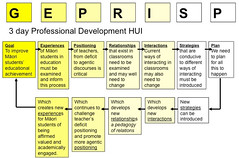 Mere recommended some resources for supporting schools to help inclusion, including some books. She also talked about the power of Communities of Practice and Wenger's notion of brokerage whereby CoPs become "important paces of negotiation, learning, meaning and identity "( Wenger, 1998, p, 133) . Over time, Mere asserted, communities develop a unique perspective on their topic as well as a body of common knowledge, practices, and approaches...They may even develop a common sense of identity.
Mere recommended some resources for supporting schools to help inclusion, including some books. She also talked about the power of Communities of Practice and Wenger's notion of brokerage whereby CoPs become "important paces of negotiation, learning, meaning and identity "( Wenger, 1998, p, 133) . Over time, Mere asserted, communities develop a unique perspective on their topic as well as a body of common knowledge, practices, and approaches...They may even develop a common sense of identity.Intervening with leadership in school systems and structures to help consideration of the relationship between what teachers are doing and what school leadership is doing - and what the interface looks like. The goal is focusing on improving target students' participation and achievement. Leadership in these interventions needs to be responsive and proactive rather than reactive.
Mere closed with the idea that effective leadership engages with influencing change then sustaining and managing reform that supports the shared vision...until it is "business as usual".
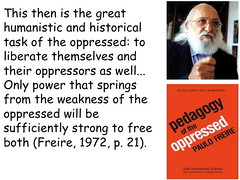
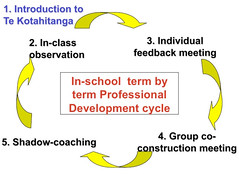
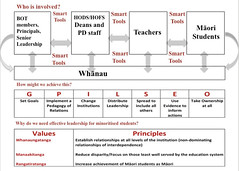






No comments:
Post a Comment